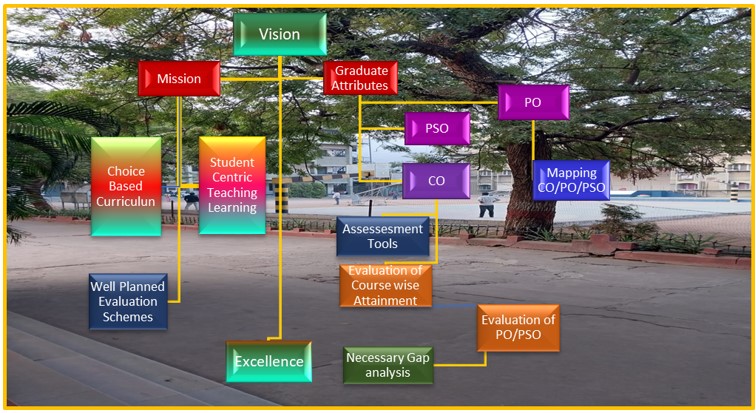Outcome Based Education
- Home
- »
- Outcome Based Education
Academics
OUTCOME BASED EDUCATION (OBE 2.0)
The autonomous status has empowered the College to design its curricula to suit the requirements of the academic progression opportunities, employment and the local needs and relevance and was an initial stone for newer tools and technology . This led to newer pedagogies like Outcome-based education (OBE), that is education in which an emphasis is placed on a clearly articulated idea of what students are expected to know and be able to do, that is, what skills and knowledge they need to have, when they leave the HEI. The student learning outcomes constitute the criteria by which curriculum is developed or redesigned, instructional materials are selected, teaching methods are adopted, and evaluation is conducted. This policy has been a collective effort involving dedication, inspiration, and integrity. Following a clear roadmap for the quality enhancement process sincere efforts are to be made to realise our vision, mission, Program Educational Objectives and Graduate Attributes through Program Outcomes, Program Specific Outcomes and Course Outcomes. It is hopeful that the success of its endeavours to promote quality sustenance and enhancement, as also to bring about stakeholder participation and involvement at all levels will come through clearly in Outcome Based Education Policy

Following a clear roadmap for the quality enhancement process, our vision, mission, Program Educational Objectives, Program Outcomes, and graduate attributes were revised and OBE 2.0 emerged.
- All departments have developed syllabi incorporating Bloom’s Taxonomy, relevant teaching pedagogy, evaluation process, and identified Program Specific Outcomes and Course Outcomes.
- Benchmaks and graduate thresholds are identified for mapping.
- Appropriate software has been developed for calculation and mapping of Course Outcomes, PSO and POs through which institutional success is measured.
- Institutional Practice
- Course attainment is evaluated at the end of each semester at the department
- Course corrective measures implemented if required.
- Department wise Course attainment is recorded/analyzed and gap analysis carried out wherever necessary
- Average attainment is evaluated at the end of Final Semester of the programme
